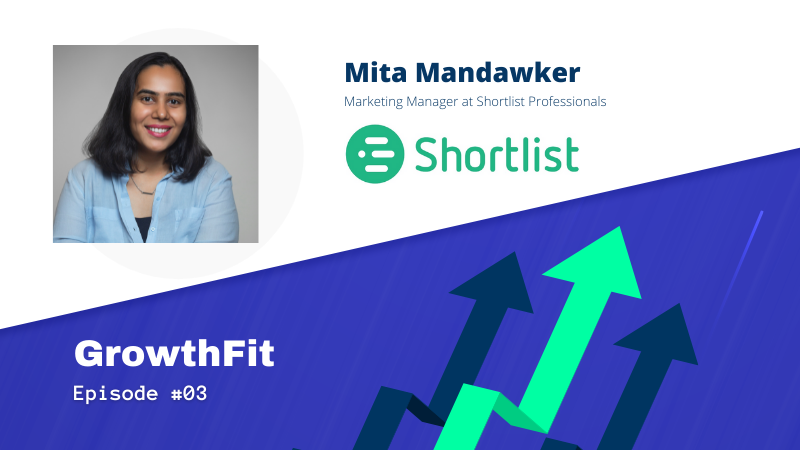Picture this.
Starting your career as an analyst with a subsidiary of an IT MNC, then jumping headlong into a marketing role at the MNC. And, then dabbling with the nuances of the advertising at an ad agency while working on an automobile brand. Hibernating from work for a year, and then moving into marketing at a family-owned business; all this put together presents a pretty audacious career path.
This is not fiction. This is the story of Mita Mandawker, a XIMR alumni, who now manages marketing at Shortlist, a startup that helps companies build and develop world-class teams. Mita owns the marketing responsibilities at a global level especially in India and Kenya, Shortlist’s primary countries of operations.
When asked about her marketing journey, Mita says that “My stints at all these places have let me experience how marketing works in all kinds of setups - big to small, especially in a B2B context. It's been pretty interesting!”
“Thank you for featuring me in the Growth Fit series, I am stoked to be a part of this. I hope this series will provide invaluable
insights into the lives of marketers to all aspiring marketing professionals out there.”
- Mita Mandawker3 secrets of a successful marketing career for new and young professionals
Mita said, “I wish someone told me about a couple of things on this list when I started working!" Here is what she sums up from her experience.
Focus on marketing operations, they are critical – She recalls coming across a post on LinkedIn which deeply resonated with her. It said,“Marketing is: 1% great ideas; 4% executing them; 95% logistical operations (making sure all the s*** nobody ever sees doesn’t break)”. This is timeless, so focus on getting this part right.
Network (internally) – This is true especially in smaller set-ups where there is one single marketing team that works across functions. Don't work in silos, build relationships with folks across the organization, understand what they do. This will help when your work dissects with different functions e.g. HR (employer branding), product (for that product-centric campaign), etc.
Experiment – Start your blog, create that podcast, start your own Instagram handle. Start with whatever it is you like or do the best. It will give you hands-on experience in creating content, understanding how it performs, and how to improve it. It will also help you gauge your interest in different aspects of marketing. It’ll make a great project to include on your resume!
3 skills necessary for marketers to grow and take their career to the next level
#1 Analytical skills – A must-have for every marketer. As a marketer, you don't just create marketing campaigns but you also see how they perform, if they were successful, what can you learn from them? An understanding of metrics helps with this.
#2 Writing - Great, concise content is the key to the success of your digital campaign. B2B marketers work a lot with content, it is vital that you are able to craft your message and communication clearly and with conviction. You don't have to be a wordsmith, but your writing needs to be engaging.
#3 Eye for graphics – You work with a lot of visuals that accompany your campaign or for the content you create (case studies, ebooks, research reports, etc.). A basic understanding of graphics and which design software is used will make this easy.
BONUS: Paid or Organic. Pick your favorite.
If you are among those who are still trying to battle between paid and organic, here’s one take on it.
Mita: Ideally, a mix of paid and organic marketing is a good place to start for any campaign. My personal favorite is organic. While you have to be a lot more intentional, and it takes time to work with organic marketing. It helps to build an authentic image and has lasting brand equity. This especially helps in times like the pandemic when you can cash in on these efforts and use your brand authority to get new customers in.
Imagine a strategy built only on paid, if all your customers get to see are ads with no educational, valuable content, it won't help you build an authentic connection or your brand image with them.
While you need both (organic and paid) to make your marketing strategy work, I will definitely pick organic for the long-term benefits one can accrue from it.
Additional marketing tidbits from Mita
We have some additional tidbits of information that would be useful for you to learn from Mita :-)
What are your sources of information about marketing and your industry? ;-)
Mita: Apart from the industry-specific blogs, I get my marketing news and updates from a whole lot of newsletters. I am subscribed to newsletters from LinkedIn Marketing, Ann Handley, Marketing Insider Group, Content Marketing Institute, First Round Review, Forbes, and a lot more!
They also share details on webinars, so attending them helps with staying abreast with the industry.
What are your lessons on marketing during the pandemic?
Mita: Agility was a key lesson during the pandemic. The marketing strategy, campaigns, budgets went out of the window with the pandemic. Marketers had to pivot rapidly to the new normal, tweaking strategy to adjust to the changing business priorities with reduced budgets and heaps of creativity.
The second would be exploring new platforms and formats (webinars, virtual fireside chats, etc.) of digital engagement to stay connected with the clients, which would earlier be done physically.
Contact Mita Mandawker
LinkedIn: linkedin.com/in/mita-mandawker/

